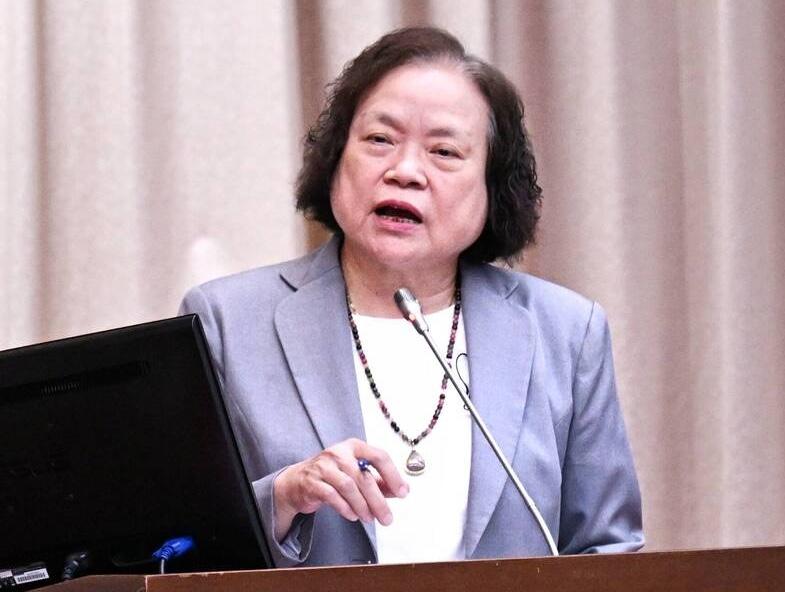The Legislative Yuan’s Finance Committee today voted to continue discussing proposed amendments that aims to require universal cash distributions if government revenues surpass the budget by a certain amount, as critics called the plan incompatible with the budget review process.
Since there is no consensus between the ruling and opposition parties and the Executive Yuan, committee members voted to keep the proposed amendment to the Budget Act (預算法) and send it to committees for further discussion.
The KMT caucus is advocating for a universal cash payment of NT$10,000 and hoping to amend the law to institutionalize “returning money to the people.”

Photo: Fang Pin-chao, Taipei Times
Chinese Nationalist Party (KMT) legislators Lai Shyh-bao (賴士葆) and Wang Hung-wei (王鴻薇) proposed amendments to Article 81-1 of the act, with the former stipulating that if tax revenue exceeds the original estimate by 20 percent, the government should implement a universal cash payment.
Wang’s proposal suggests a payment should be made if revenue exceeds the budget by NT$300 billion (US$9.1 billion).
Another version of the amendment, proposed by KMT Legislator Lin Te-fu (林德福), prioritizes using excess tax revenue to reduce government debt, expand support for disadvantaged groups and contribute to various insurance funds, with the Executive Yuan responsible for adjusting the budget accordingly.
According to the Constitution, the Legislative Yuan is responsible for reviewing the budget, not proposing it, Democratic Progressive Party (DPP) Legislator Wu Ping-jui (吳秉叡) said.
If universal cash payments are implemented, it should be done through a separate act rather than amendments to the Budget Act, DPP Legislator Wang Shih-chien (王世堅) said.
Directorate-General of Budgeting, Accounting and Statistics Minister Chen Shu-tzu (陳淑姿) said the agency does not support the proposed amendments.
The government distributed universal cash payments of NT$6,000 in 2022, which could serve as the threshold for these payments, Lin said.
However, Chen said that the cash distribution in 2022 had a special purpose.
It was designed to accelerate the economy’s recovery after the COVID-19 pandemic by encouraging consumers to spend, she said.
At that time, the economic growth rate was only 2.1 percent and the cash distribution was intended to maintain economic growth, she added.
The government would first focus on using excess tax revenue to pay debts and reduce borrowing, Deputy Minister of Finance Frank Juan (阮清華) said.
Any remaining surplus would then be allocated to the general budget, which could be used to support people’s livelihoods, disadvantaged groups and national defense, Juan said.
Additional reporting by CNA

A small number of Taiwanese this year lost their citizenship rights after traveling in China and obtaining a one-time Chinese passport to cross the border into Russia, a source said today. The people signed up through Chinese travel agencies for tours of neighboring Russia with companies claiming they could obtain Russian visas and fast-track border clearance, the source said on condition of anonymity. The travelers were actually issued one-time-use Chinese passports, they said. Taiwanese are prohibited from holding a Chinese passport or household registration. If found to have a Chinese ID, they may lose their resident status under Article 9-1

Taiwanese were praised for their composure after a video filmed by Taiwanese tourists capturing the moment a magnitude 7.5 earthquake struck Japan’s Aomori Prefecture went viral on social media. The video shows a hotel room shaking violently amid Monday’s quake, with objects falling to the ground. Two Taiwanese began filming with their mobile phones, while two others held the sides of a TV to prevent it from falling. When the shaking stopped, the pair calmly took down the TV and laid it flat on a tatami mat, the video shows. The video also captured the group talking about the safety of their companions bathing

A classified Pentagon-produced, multiyear assessment — the Overmatch brief — highlighted unreported Chinese capabilities to destroy US military assets and identified US supply chain choke points, painting a disturbing picture of waning US military might, a New York Times editorial published on Monday said. US Secretary of Defense Pete Hegseth’s comments in November last year that “we lose every time” in Pentagon-conducted war games pitting the US against China further highlighted the uncertainty about the US’ capability to intervene in the event of a Chinese invasion of Taiwan. “It shows the Pentagon’s overreliance on expensive, vulnerable weapons as adversaries field cheap, technologically

Starting on Jan. 1, YouBike riders must have insurance to use the service, and a six-month trial of NT$5 coupons under certain conditions would be implemented to balance bike shortages, a joint statement from transportation departments across Taipei, New Taipei City and Taoyuan announced yesterday. The rental bike system operator said that coupons would be offered to riders to rent bikes from full stations, for riders who take out an electric-assisted bike from a full station, and for riders who return a bike to an empty station. All riders with YouBike accounts are automatically eligible for the program, and each membership account